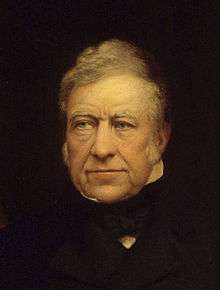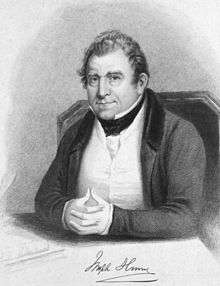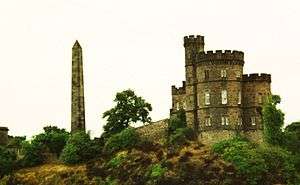Joseph Hume
Joseph Hume FRS (22 January 1777 – 20 February 1855) was a Scottish doctor and Radical MP.[1]

Early life
He was born the son of a shipmaster in Montrose, Angus and apprenticed to a local surgeon.
Medical career
He studied medicine at the University of Edinburgh and moved to India in 1797. There, he was commissioned as a surgeon to an Army regiment, and was able to take up work as an interpreter and commissary-general due to his knowledge of Indian languages.
His knowledge of chemistry helped him provide the administration with a method to recover damp gunpowder in 1802, on the eve of Lord Lake's Maratha war. In 1808, he resigned and returned home with a fortune of about £40,000.
Between 1808 and 1811, he travelled around England and Europe and, in 1812, published a blank verse translation of The Inferno.
In 1818 he was elected a Fellow of the Royal Society by virtue of being, according to his nomination citation, "well versed in various branches of Useful knowledge and particularly in Chimistry, in various branches of oriental literature and Antiquities".[2]
Political career
In 1812, he purchased a seat in Parliament for Weymouth, Dorset, England, and voted as a Tory. When the parliament was dissolved the patron refused to return his money, and Hume brought an action to recover part of it. Six years later, Hume again entered the House, and made acquaintance with James Mill and the philosophical reformers of the school of Jeremy Bentham. He joined with Francis Place, of Westminster, and other philanthropists, to help improve the condition of the working classes, labouring especially to establish schools for them on the Lancastrian system, and forming savings banks.
In 1818, soon after getting married, he was returned to Parliament as member for the Aberdeen Burghs, Borders, Scotland. He was afterwards successively elected for Middlesex, England (1830), Kilkenny, Ireland (1837) and for the Montrose Burghs, Montrose, Scotland (1842), in the service of which constituency he died.
Political campaigns
_RMG_PW3971.jpg)

From the date of his re-entering Parliament, Hume became the self-appointed guardian of the public purse, by challenging and bringing to a direct vote every single item of public expenditure. In 1820, he secured the appointment of a committee to report on the expense of collecting tax revenue. He was very active and became known as someone who gave Chancellors of the Exchequer no peace. He exercised a check on extravagance, and helped to abolish the sinking fund. It was he who caused the word "retrenchment" to be added to the Radical programme "peace and reform." He carried on a successful warfare against the old anti-trade union combination laws that hampered workmen and favoured masters. He brought about the repeal of the laws prohibiting the export of machinery, and of the act preventing workmen from going abroad. He constantly protested against flogging in the army, the impressment of sailors and imprisonment for debt.

In 1837 he initiated a plan for a memorial to the Scottish Political Martyrs.[3] The monument is in the form of a 90-foot (27 m) obelisk of grey-black sandstone blocks, and is inscribed with the names of the five men:
- Thomas Muir
- Joseph Gerrald
- Thomas Fyshe Palmer
- William Skirving and
- Maurice Margarot
On 21 August 1844, 3000 gathered to see Hume lay the monument's foundation stone at the Old Calton Cemetery, Edinburgh.
In February 1852, a second monument to the Scottish Political Martyrs, again initiated by Hume, was unveiled at Nunhead Cemetery, London.[4]
Personal life
Hume married Maria Burnley, the daughter of an East India Company director, and had nine children, the eighth of which was Allan Octavian Hume, the notable ornithologist and founder of the Indian National Congress.
Death
He died at his seat, Burnley Hall, Norfolk in 1855 and is buried to the north-east of the main chapel in Kensal Green Cemetery in London next to his good friend William Williams.
Legacy
A memorial of Hume was published by his son Joseph Hume (London, 1855). Another son, Allan Octavian Hume, a renowned ornithologist, also went into the Indian Civil Service and was involved in much political activism during his career, especially on behalf of India, and founded the Indian National Congress.
According to Hawkins' History of the Silver Coinage of England, a groat was known as a "Joey", "so called from Joseph Hume, M.P., who strongly recommended the coinage for the sake of paying short cab-fares, etc."[5]
A statue of Hume stands in the High Street of Montrose, at its intersection with Hume Street .
References
- Ronald K. Huch, Paul R. Ziegler 1985 Joseph Hume, the People's M.P.: DIANE Publishing. ISBN 0-87169-163-9
- "Fellow details". Royal Society. Retrieved 4 March 2017.
- Christina Bewley. Muir of Huntershill/ Oxford University Press. 1981. ISBN 0-19-211768-8
- Wally MacFarlane. "The Scottish Martyrs", a pamphlet published by the Friends of Nunhead Cemetery.
- E. Cobham Brewer (1898) Dictionary of Phrase and Fable.
External links
| Wikimedia Commons has media related to Joseph Hume. |
- Hansard 1803–2005: contributions in Parliament by Joseph Hume
- Bio (to 1832) at History of Parliament Online
| Parliament of the United Kingdom | ||
|---|---|---|
| Preceded by Charles Adams Richard Steward Sir John Lowther Johnstone, Bt Sir John Murray, Bt |
Member of Parliament for Weymouth and Melcombe Regis 1812–1812 With: Charles Adams Richard Steward Sir John Murray, Bt |
Succeeded by Sir John Murray, Bt Thomas Wallace John Broadhurst Henry Trail |
| Preceded by James Farquhar |
Member of Parliament for Aberdeen Burghs 1818–1830 |
Succeeded by Sir James Carnegie, Bt |
| Preceded by George Byng Samuel Charles Whitbread |
Member of Parliament for Middlesex 1830–1837 With: George Byng |
Succeeded by George Byng Thomas Wood |
| Preceded by Daniel O'Connell |
Member of Parliament for Kilkenny City 1837–1841 |
Succeeded by John O'Connell |
| Preceded by Patrick Chalmers |
Member of Parliament for Montrose Burghs 1842–1855 |
Succeeded by William Edward Baxter |
| Academic offices | ||
| Preceded by The 4th Earl Fife |
Rector of Marischal College, Aberdeen 1824–1825 |
Succeeded by Sir James McGrigor |
| Preceded by Sir James McGrigor |
Rector of Marischal College, Aberdeen 1828–1829 |
Succeeded by ? |